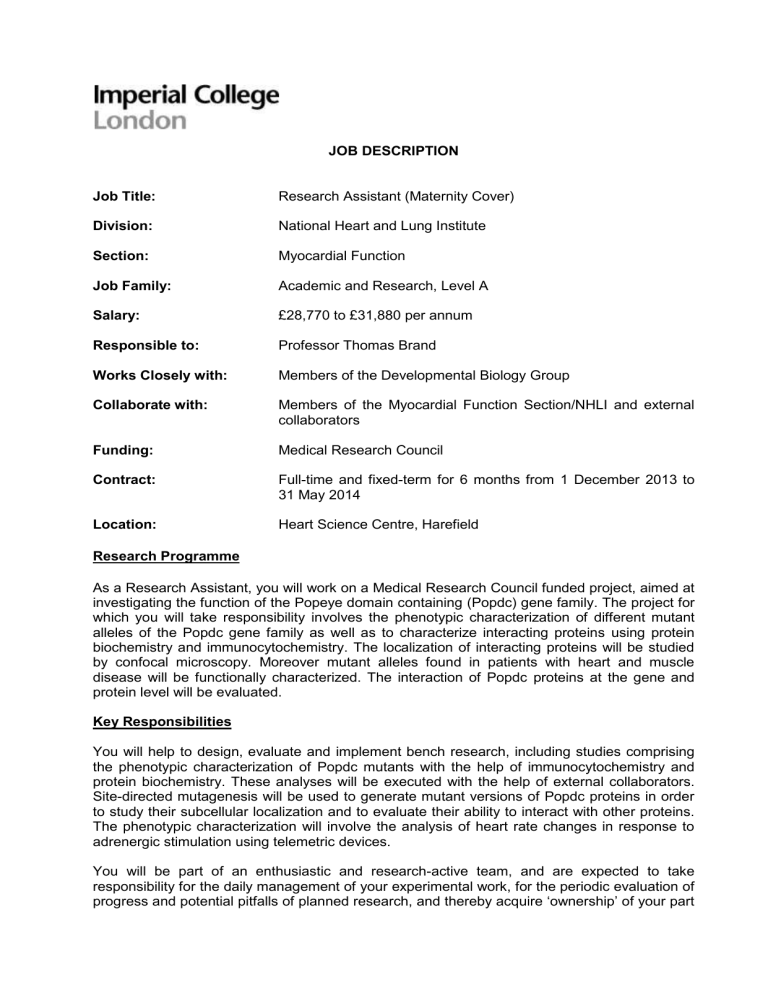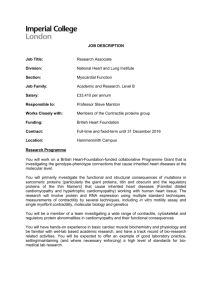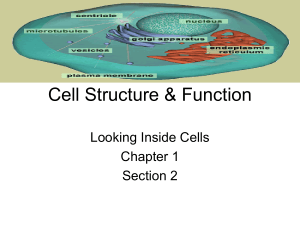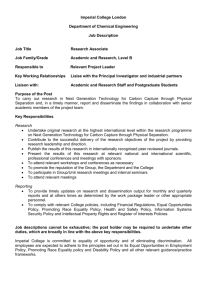Research Programme - Workspace

Job Title:
Division:
Section:
Job Family:
Salary:
Responsible to:
Works Closely with:
Collaborate with:
Funding:
Contract:
Location:
Research Programme
JOB DESCRIPTION
Research Assistant (Maternity Cover)
National Heart and Lung Institute
Myocardial Function
Academic and Research, Level A
£28,770 to £31,880 per annum
Professor Thomas Brand
Members of the Developmental Biology Group
Members of the Myocardial Function Section/NHLI and external collaborators
Medical Research Council
Full-time and fixed-term for 6 months from 1 December 2013 to
31 May 2014
Heart Science Centre, Harefield
As a Research Assistant, you will work on a Medical Research Council funded project, aimed at investigating the function of the Popeye domain containing (Popdc) gene family. The project for which you will take responsibility involves the phenotypic characterization of different mutant alleles of the Popdc gene family as well as to characterize interacting proteins using protein biochemistry and immunocytochemistry. The localization of interacting proteins will be studied by confocal microscopy. Moreover mutant alleles found in patients with heart and muscle disease will be functionally characterized. The interaction of Popdc proteins at the gene and protein level will be evaluated.
Key Responsibilities
You will help to design, evaluate and implement bench research, including studies comprising the phenotypic characterization of Popdc mutants with the help of immunocytochemistry and protein biochemistry. These analyses will be executed with the help of external collaborators.
Site-directed mutagenesis will be used to generate mutant versions of Popdc proteins in order to study their subcellular localization and to evaluate their ability to interact with other proteins.
The phenotypic characterization will involve the analysis of heart rate changes in response to adrenergic stimulation using telemetric devices.
You will be part of an enthusiastic and research-active team, and are expected to take responsibility for the daily management of your experimental work, for the periodic evaluation of progress and potential pitfalls of planned research, and thereby acquire ‘ownership’ of your part
of this project. You will be expected to pass on your expertise via training and supervision of students working with you on the project. You will also communicate your results through presentations and publications and assist in report writing where relevant.
Research Duties
To carry out research aimed at characterizing the function of the Popdc gene family
To have or obtain proficiency in, and comply with, UK Home Office regulations relevant for the work
To conduct preparation, implementation, analysis, interpretation, and communication of experimental research, including taking responsibility for day-to-day planning, scheduling, and implementation of independent research
To work constructively as part of a multidisciplinary team, contributing skills and expertise to the smooth running of this project
To work independently with minimal supervision
To contribute to the smooth running of the Group’s lab facilities, liaising with other scientists, clinicians, technicians and students
To adhere to best practice and to assist with daily coordination of shared lab activities
To ensure maintenance of a clean, healthy working environment in keeping with applicable health and safety standards
To maintain a highly organised, accurate, and accessible record of experimental work and data, documenting all relevant research aspects in line with the minimum standard for reporting
To conduct data analysis, ensuring the validity and reliability of data at all times including, where necessary, further training in statistics
To keep up-to-date with scientific advances in the field, including continuing professional development, and to undertake literature searches and reviews related to the proposed programme of cardiac structure-function studies
To contribute to project student supervision on topics associated with the planned programme of work
To provide training and advice to research and technical staff and visiting students or academics, as required by the varying needs of these individuals
To contribute to the intellectual activities of the laboratory and its entire range of research, including participation in group meetings and attendance at, or, contribution to internal/external seminars and meetings
To present findings at relevant national and international workshops and conferences
Any other duties which may arise commensurate with the grade of the post as directed by the Head of group, as well as the Head of Division/Department/Section
Other Duties
To undertake appropriate administration tasks
To undertake any necessary training and/or development
To attend relevant meetings
To observe and comply with all College policies and regulations, including the key policies and procedures on Confidentiality, Conflict of Interest, Data Protection, Equal
Opportunities, Financial Regulations, Health and Safety, Imperial Expectations (for new leaders, managers and supervisors), Information Technology, Private Engagements and
Register of Interests, and Smoking.
To undertake specific safety responsibilities relevant to individual roles, as set out on the College Website Health and Safety Structure and Responsibilities page
(http://www3.imperial.ac.uk/safety/policies/organisationandarrangements).
Job descriptions cannot be exhaustive and the post-holder may be required to undertake other duties, which are broadly in line with the above key responsibilities.
Imperial College is committed to equality of opportunity and to eliminating discrimination. All employees are expected to adhere to the principles set out in its
Equal Opportunities in Employment Policy, Promoting Race Equality Policy and all other relevant guidance/practice frameworks.
IMPERIAL COLLEGE LONDON
PERSON SPECIFICATION
Qualifications
Essential
Educated to BSc and MSc degree level in Cell Biology, Protein Biochemistry, or
Molecular Biology or in a closely related quantitative discipline (e.g. Physiology), or equivalent research / industrial / commercial experience
Certificate of completion of Home Office training modules 1-4
Desirable
Knowledge of at least one of the following:
- Phenotypic characterization of cardiovascular phenotypes
- Molecular characterization of membrane proteins and their protein interaction
- Confocal microscopy to study subcellular localization of proteins in cardiac myocytes
Experience and Knowledge
Essential
Hands-on track-record with basic biological ‘wet-lab’ research relevant for this study
(such as co-immunoprecipitation, Western blot analysis, production of GST-fusion proteins, site-directed mutagenesis, confocal immunohistochemistry, implantation of telemetric devices and the phenotypic characterization of mutants)
Demonstrable experience in conducting biomedical research on the genetic basis of cardiac arrhythmia and heart failure
Emerging track-record in communication of research findings, as witnessed by presentations and publications in peer-reviewed journals
Practical expertise in data analysis and statistical procedures to support experimental design and data interpretation
Working knowledge of general wet-lab techniques, instrumentation, and maintenance
Previous experience in adhering to or implementing of good laboratory practice in a research laboratory environment, either in academia or industry
Desirable
Experience in data analysis using computer programs for phenotyping
Experience in membrane protein biochemistry
Knowledge of special techniques to study protein-protein interactions in situ such as proximity ligation assay or FRET technique
Skills and Abilities
Essential
Demonstrable capability to take a lead in conducting independent research, after suitable instruction and training
Ability to critically review project progress, and to provide intellectual input into the continued development of research
Ability to develop and apply new concepts / tools / techniques
Ability to work independently and as a constructive part of a multi-disciplinary team
Excellent written and verbal communication skills, with particular emphasis on writing succinctly for publication
Creative approach to problem-solving
Attention to detail
Proven organisational skills and ability to plan ahead, set priorities and work to deadlines
Ability and willingness to perform routine and non-routine tasks effectively
Ability and willingness to adapt to changing timetables or work patterns as may be dictated by changing project requirements
Ability and willingness to use personal initiative to accomplish tasks in an efficient and timely manner
Advanced computer skills, including word-processing, spreadsheets and the Internet
Other Requirements
Willingness to work unsociable hours, as work demands from time to time
Active involvement with daily running and functioning of the laboratory
Discipline and regard for confidentiality and security at all times









